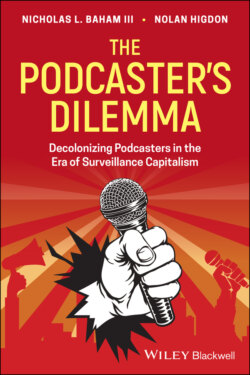Читать книгу The Podcaster's Dilemma - Nolan Higdon - Страница 12
Outline of the Book
ОглавлениеThis text chronicles the dynamic rise of podcasts that seek decolonization from the dominant ideological structures. In order to identify the podcasts participating in decolonization, we did an Internet search of podcasts that specifically mentioned a focus on identities of class, race, gender, sexuality, and ability. We wanted to see how these identity groups were using podcasting as a way to decolonize themselves – that is, to free themselves from colonial mentalities. An Internet search resulted in a list of over 100 podcasts, which are profiled in Chapter 1.
The interrogation and critique phase is the subject of Chapter 2. The interrogation and critique process involves questioning the veracity of neoliberal, racist, imperialist, patriarchal, heterosexist, classist, and ableist white-centered ideologies. Many of our surveyed podcasts have either explicit or implicit criteria for evaluating truthfulness in media and the relevance of information. The healthy skepticism of our podcasters is certainly conveyed through content, but also performatively, through tone, through colorful language, through colloquial and regionally relevant idioms, biting humor, and irony.
In Chapter 3 we focus on the counter-narrative production phase of a decolonizing podcaster’s process. This phase involves the intentional production of community-based counter-narratives, in an attempt to destabilize, decenter, and deconstruct dominant cultural assumptions. The presentation of community-based activists and alternative voices stands in stark contrast to the conga line of corporate and deep-state players hawking books that espouse dominant ideologies on corporate media outlets. In this phase, our podcasters contribute to the increase of digital information literacy in their communities and to a significant reappropriation of not only digital technologies but also the very language and discursivity of dominant thought.
The fourth chapter explores the community activism or praxis phase of decolonizing podcasters, in which both interrogation-and-critique and counter-narrative production lead to active dissent and protest. These podcasts are typically hosted by movement activists and offer direct encouragement and instruction to activists and leaders. Listeners are encouraged to take their education to the streets and to the halls of power. The instruction and advice offered by experienced activists and movement leaders range from tips for remaining vigilant in the face of neoliberalism’s soft tyranny to self-healing and meditation and to instructions on how to deal with the police when arrested. In the community activist phase of podcasting, podcasts serve as “connective tissue” in connecting with the community and a basis “for the birth of new social relationships.”54 Here we find the organizing potential of media and Bonini’s affirmation: “Since the times of Luther there has been no political revolution that has not taken advantage of the media of its age.”55 However, we found a relative dearth of praxis-oriented podcasts in the decolonial podcasting space. We were also surprised to find a lack of discourse about empire and indigeneity – which are central features in decolonial scholarship – in the podcasting space.
The fifth and final chapter examines the vulnerabilities and gaps we discovered in our survey of decolonial podcasting. We explore gaps in content and the vulnerabilities that decolonial podcasters are facing – all of which goes to create what we call “the podcaster’s dilemma.” The dilemma lies in the fact that podcasters resist dominant ideologies, but these are the very ideologies that control and shape many of the tools and platforms they rely upon for producing and disseminating the media. This presents a problem for podcasters. Should they take advantage of the opportunities afforded by digital tools, even though this makes them susceptible to the exploitation exerted by surveillance capitalism? On the one hand, podcasts have the ability to communicate awareness, connect activists, and create organized resistance to hegemonic structures and institutions. On the other hand, podcasts serve the oppressive practices of surveillance capitalism by generating user data that are harvested and weaponized against marginalized communities. This is the podcaster’s dilemma. We explore it further in Chapter 5.
The object of this book is to avoid passing judgment on media producers, as we are hosts of the podcast Along the Line, which operates in a similar space. Our study will advance the field of both podcasting and decolonization. Our goal is to better understand the limits and potential of podcasting. As we write this text, we are witnessing the simultaneous rise of overt corporatist, white supremacist, and patriarchal discourses in mainstream media spaces, alongside protests for racial justice such as those that followed the murder of George Floyd in 2020, the #StopAsianHate movement in the midst of the COIVD-19 pandemic, and calls for dismantling patriarchy such as those evidenced by the #MeToo movement. Given that this is taking place in a highly mediated space (even more so as audiences are bivouacked by the shift to online education, employment, and communication during the COVID-19 pandemic), the exigencies – in digital tools in general and in popular podcast spaces in particular – that are needed for addressing colonial mentalities in our society are well understood.
